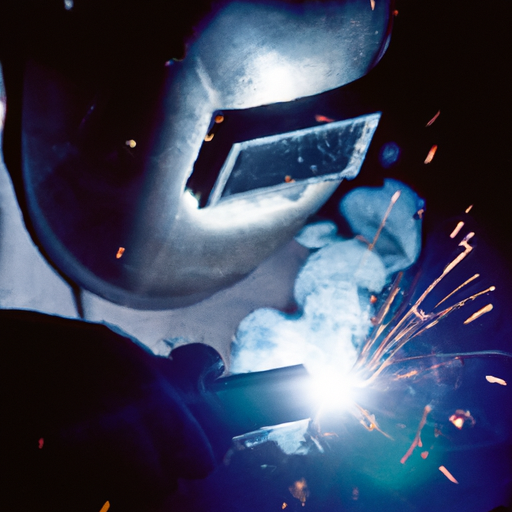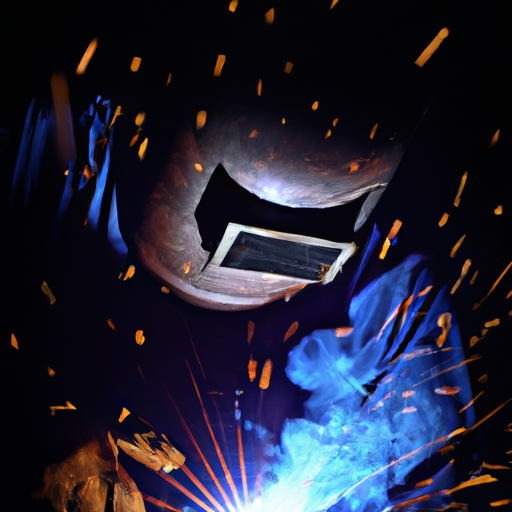Being a welder can be a rewarding career choice, but like any job, it also has its downsides. From the physical demands to the risk of injury, there are several negatives that come with being a welder. However, it’s important to remember that these negatives can vary depending on individual circumstances and work environments. In this article, we will explore some of the common challenges that welders may face, offering an insightful perspective on the potential drawbacks of this profession. So, if you’re curious about the downsides of being a welder, keep reading to gain a deeper understanding.
Physical Health Issues
Risk of burns and injuries
As a welder, you face a significant risk of burns and injuries. The intense heat and sparks generated during welding can cause severe burns if not properly protected. Additionally, there is always a risk of accidents like cuts or punctures from sharp metal objects or flying debris. Ensuring proper protective gear, such as welding gloves, helmets with face shields, and flame-resistant clothing, is essential to minimize these risks.
Chronic Musculoskeletal disorders
Welding involves repetitive movements and working in awkward positions for extended periods. This can lead to the development of chronic musculoskeletal disorders such as tendinitis, carpal tunnel syndrome, and back pain. The constant strain on muscles and joints can result in long-term physical discomfort and reduced flexibility. Implementing ergonomic practices and taking regular breaks to stretch and rest can help alleviate these issues.
Exposure to intense light and heat
Welders are exposed to intense light and heat emitted during welding processes. Prolonged exposure to these conditions can lead to visual impairments such as cataracts and temporary flash blindness. Moreover, the high temperatures can cause heat-related illnesses, including heat exhaustion and heat stroke. Utilizing proper eye protection, like welding goggles with shade lenses, and maintaining adequate hydration are crucial measures to mitigate these risks.
Chronic Respiratory Conditions
Inhalation of toxic fumes
Welding involves the use of various materials and metals, some of which produce toxic fumes when heated. Inhaling these fumes can result in acute and chronic respiratory conditions, including metal fume fever, asthma, and bronchitis. It is essential to work in well-ventilated areas, utilize respiratory protection such as masks equipped with filters, and take regular breaks in fresh air to minimize exposure to these harmful substances.
Risk of developing lung diseases
Long-term exposure to welding fumes, especially those containing hazardous metals like chromium, nickel, and manganese, increases the risk of developing severe lung diseases such as pneumoconiosis and lung cancer. Implementing engineering controls such as local exhaust ventilation systems and utilizing suitable respiratory protective equipment can reduce the inhalation of harmful substances and lower the chances of these diseases.
Lack of proper ventilation in some workplaces
Despite the importance of proper ventilation in welding environments, it may not always be available or adequately maintained in some workplaces. The lack of ventilation increases the concentration of fumes and gases in the air, posing a more significant risk to the welder’s respiratory health. Employers should prioritize the installation and regular maintenance of effective ventilation systems to ensure a safe working environment for welders.

Mental Health Stressors
High stress levels due to workload
The demanding nature of welding work can lead to high levels of stress. Welders often face tight deadlines, complex projects, and the pressure to produce high-quality welds consistently. Moreover, the potential consequences of making mistakes or compromising safety can add to the stress levels. It is crucial for welders to practice stress management techniques, such as deep breathing exercises, time management, and seeking support from colleagues or mental health professionals.
Isolation due to solitary work environment
Welding is often carried out in isolated or confined spaces, limiting social interaction with coworkers. This can result in feelings of isolation and loneliness, which may negatively impact mental health. Maintaining open lines of communication with colleagues, engaging in team-building activities, and seeking opportunities for social interaction during breaks can help alleviate these feelings of isolation.
High-risk jobs inducing anxiety
Welders often work in high-risk environments where safety hazards are prevalent. This constant exposure to potential accidents, injuries, or even fatality can lead to heightened anxiety levels. It is crucial for welders to receive proper safety training, understand and adhere to safety protocols, and have access to appropriate personal protective equipment. Employers should also prioritize regular safety inspections and maintain a culture of safety within the workplace.
Hazardous Working Conditions
Risk of accidents
Working with heavy machinery, electrical equipment, and high temperatures poses a significant risk of accidents for welders. The potential for slips, falls, or being struck by moving objects is ever-present. Employers need to provide proper training, implement safety protocols, and ensure a clean and organized work environment to minimize the occurrence of accidents. Additionally, wearing appropriate personal protective equipment can significantly reduce the severity of injuries in case of accidents.
Exposure to hazardous materials
Welding involves handling and working with hazardous materials such as solvents, adhesives, and paints. Prolonged exposure to these substances without proper protection can lead to skin irritations, respiratory issues, or even long-term health problems. Employers should provide adequate personal protective equipment suitable for the specific chemicals used and educate welders on safe handling and disposal practices.
Inconsistent safety standards in some workplaces
While safety regulations and standards exist to protect workers, not all workplaces adhere to them consistently. In some cases, employers may overlook or neglect to enforce safety measures, putting welders at unnecessary risk. It is vital for welders to advocate for their safety rights and report any unsafe working conditions or practices. Encouraging open communication and regularly reviewing safety protocols can help create a safer work environment.

Long Working Hours
Overtime work
Welders often face long working hours, including overtime, to meet project deadlines or manage unexpected repairs. These extended shifts can lead to physical and mental fatigue, reducing concentration and increasing the likelihood of errors or accidents. Balancing workload, scheduling breaks, and considering the implementation of shift rotations can help mitigate the negative effects of long working hours.
Manual labor leading to physical exhaustion
The physically demanding nature of welding, which often involves heavy lifting, carrying equipment, and working in uncomfortable positions, can result in physical exhaustion. Continuous strain on the body without adequate rest or recovery can lead to decreased productivity, increased risk of accidents, and a decline in overall well-being. Prioritizing rest, proper nutrition, and engaging in regular exercises or stretching routines can help reduce physical exhaustion.
Effects on personal life and family time
The long working hours associated with welding can have a significant impact on personal life and family time. Welders may find it challenging to balance work commitments with personal responsibilities, resulting in limited time for leisure, hobbies, or spending quality time with loved ones. Employers and workers should explore flexible scheduling options and promote work-life balance to ensure welders have adequate time for rest, recreation, and nurturing their personal relationships.
Career Progression
Limited career advancement opportunities
In some industries and workplaces, welders may experience limited career advancement opportunities. The perception of welding as a less prestigious occupation compared to others can result in fewer opportunities for professional growth or higher-level positions. However, pursuing additional certifications, attending training programs, or exploring specialized areas such as inspection or robotics welding can expand career prospects and open doors for advancement.
Lack of diversity in tasks
Welders may find themselves engaged in repetitive tasks or working on similar projects, limiting opportunities to diversify their skills and experience. This lack of variety can lead to boredom, decreased motivation, and reduced job satisfaction. It is crucial for welders to seek out opportunities to work on different types of projects or collaborate with colleagues in various specialties to broaden their skill set and maintain enthusiasm for their work.
High competition in the field
Due to the popularity and demand for welding professionals, there can be intense competition for job opportunities. This competition can make it challenging for entry-level welders to secure stable employment or negotiate favorable compensation packages. It is important for welders to continuously update their skills, stay informed about industry developments, and build a strong professional network to stand out in a competitive job market.

Job Instability
Economic fluctuations impacting job security
The welding profession is susceptible to economic fluctuations. During times of economic downturn or industry slowdowns, there may be reduced demand for welders, leading to job instability. Welders may experience temporary layoffs or struggle to find new employment opportunities during these periods. Maintaining a diverse set of skills, staying adaptable, and considering geographical mobility can help mitigate the impact of economic fluctuations on job security.
Dependency on construction and manufacturing industries
Welding is closely tied to the construction and manufacturing industries. Therefore, any challenges faced by these sectors, such as decreased investment or market volatility, directly impact the demand for welders. Economic shifts within these industries can result in limited job opportunities or reduced working hours for welders. It is essential for welders to stay informed about industry trends and consider diversifying their skills to remain employable across multiple sectors.
Lack of steady work in certain regions
Geographical location can also influence job stability for welders. Some regions may have higher demand and a more robust welding industry, offering more consistent employment opportunities. However, other areas may have limited infrastructure projects or a smaller industrial presence, resulting in a lack of steady work options. Considering relocation or exploring remote work possibilities can be potential solutions to mitigate job instability due to regional factors.
Intense Training Requirements
Time and cost of gaining certifications
Becoming a certified welder requires a significant investment of time and money. The training process involves completing vocational courses, on-the-job training, and passing certification exams. The duration and cost of training can vary depending on the desired level of certification and the availability of training programs. Prospective welders should be prepared to commit to these requirements and allocate resources accordingly to obtain the necessary certifications.
Need for continuous learning and updating skills
Welding technology and techniques are continually evolving, making it imperative for welders to engage in continuous learning and skill updates. Staying abreast of new technologies, welding processes, and safety regulations is vital to remain competitive and employable. Participating in industry workshops, attending seminars, and regularly practicing new techniques can help welders stay at the forefront of their field and enhance their career prospects.
Physical robustness required for vocational training
Vocational training for welding often involves rigorous physical activities, including lifting heavy objects, working in challenging conditions, and enduring prolonged exposure to intense heat and noise. Prospective welders should be prepared to meet the physical demands of the training, ensuring they are in good health and capable of withstanding the physical rigors of the profession. Building physical strength and endurance through exercise and maintaining a healthy lifestyle can facilitate the training process.

Limited Employment Benefits
Lack of comprehensive health insurance
Some welding occupations and workplaces may not provide comprehensive health insurance coverage for their employees. The absence of adequate health insurance can pose a financial burden on welders, making it challenging to access necessary medical care and treatment. It is crucial for welders to consider the availability and coverage of health insurance when evaluating potential job opportunities and explore alternative options for insurance coverage if necessary.
Limited paid leave options
Welders may encounter limited paid leave options, including vacation time, sick leave, or personal days, depending on their employment arrangements. This lack of sufficient paid leave can hinder their ability to take time off for medical reasons or personal emergencies without facing potential financial repercussions. It is vital for welders to negotiate fair leave policies with employers and consider the availability of state or federal leave benefits to ensure their overall well-being.
Few retirement benefits
In comparison to certain professions, welding may offer relatively fewer retirement benefits. Traditional pension plans may be less common, and employer-matched retirement savings programs, such as 401(k) plans, may be limited in some workplaces. Welders should be proactive in planning for their retirement, considering individual retirement accounts (IRAs) or consulting financial advisors to establish personal savings strategies that align with their long-term goals.
Environmental Impact
Emissions contributing to pollution
Welding processes can contribute to environmental pollution through the emissions produced. Fumes, gases, and particulate matter released during welding operations can contribute to air pollution, affecting both indoor and outdoor air quality. Implementing effective mechanical ventilation systems, utilizing emission control devices, and adopting sustainable welding practices, such as reducing metal waste and optimizing energy usage, can help minimize the environmental impact of welding activities.
Welding waste disposal concerns
Welding generates waste materials, including slag, welding rods, and metal scraps, which need proper disposal. Inadequate waste management can lead to environmental pollution and potential health hazards. It is crucial for welders to adhere to proper waste disposal practices, segregate recyclable materials, and work with employers to establish efficient waste management systems. Recycling or reusing metal scraps and promoting sustainable welding practices can further minimize waste generation.
Noise pollution
Welding processes often generate significant levels of noise, which can have detrimental effects on both welders and those in the surrounding environment. Prolonged exposure to high levels of noise can lead to hearing loss, tinnitus, and other auditory disorders. Reducing noise levels through the use of noise-reducing barriers, implementing engineering controls, and utilizing hearing protection devices is essential to protect the hearing health of welders and promote a healthier working environment.
In conclusion, while welding offers unique career opportunities and job prospects, it is essential to recognize and address the potential negatives associated with this field. From physical health issues to mental health stressors, hazardous working conditions, and limitations in employment benefits, welders face various challenges in their profession. By prioritizing safety measures, pursuing continuous learning, advocating for proper workplace conditions, and considering personal well-being, welders can navigate these negatives more effectively and find fulfillment and success in their welding careers.

